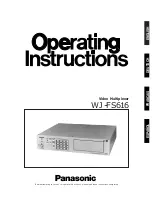
3
RESISTANCE MEASUREMENT
CONTINUITY MEASUREMENT
DIODE TEST
CAPACITANCE MEASUREMENT
SPECIFICATION
• Press SELECT to select Ω measurement mode.
• Connect the test leads with the object being measured.
• The measured value shows on the display.
• When resistance measurement has been completed,
disconnect the testing leads from the circuit under test, and
remove the testing leads from the input terminals of the
Meter.
• Press SELECT to select
measurement mode.
• Connect the test leads with the object being measured.
• The measured value shows on the display.
• The buzzer sounds continuously if the resistance of a
circuit under test is <30Ω, indicating the circuit has a good
connection.
• When continuity measurement has been completed,
disconnect the testing leads from the circuit under test, and
remove the testing leads from the input terminals of the
Meter.
• Press SELECT to select measurement mode.
• Connect the test leads with the object being measured.
• The measured value shows on the display.
• For best accuracy, remove the component being measured
from the circuit before measurement.
• When diode measurement has been completed, disconnect
the testing leads from the item under test, and remove the
testing leads from the input terminals of the Meter.
Note:
Open Circuit Voltage is around 3V, the display shows
approximate forward voltage drop.
A good diode should produce a forward voltage drop of 0.5V
to 0.8V.
• Press SELECT to select measurement mode.
• Connect the test leads with the object being measured.
• The measured value shows on the display.
• For best accuracy, remove the component being measured
from the circuit before measurement.
• When capacitance measurement has been completed,
disconnect the testing leads from the item under test, and
remove the testing leads from the input terminals of the
Meter.
Warning:
To avoid damage to the Meter or to the equipment
under test, disconnect circuit power and discharge all high
voltage capacitors before measuring capacitance. Use the DC
Voltage function to confirm that the capacitor is discharged.
Function
Range/description
Operating Temperature 0
o
~40
o
C (32
o
F~104
o
F)
Storage Temperature
-10
o
C~50
o
C (14
o
F~122
o
F)
Battery Type
3V Li-MnO2 Button cell
Altitude
Operating: 2000m
Display/Update
Max 3000/4 times per second
AC/DC Voltage
0 to 300V rms
Dimensions (H x W x L) 20.2 x 26.5 x 181.5mm
Weight
90g incl battery
Range
Resolution
Accuracy
O/L Protection
3V AC
0.001V
± (1%+4)
300Vrms
30V AC
0.01V
300V AC
0.1V
Remarks:
Input Impedance: 10MΩ Frequency Response: 40Hz~400Hz
3V DC
0.001V
± (1%+3)
300Vrms
30V DC
0.01V
300V DC
0.1V
Remarks:
Input Impedance: ≥10MΩ
300Ω
0.1Ω
± (1%+3)
300Vrms
3kΩ
1Ω
30kΩ
10Ω
300kΩ
100Ω
3MΩ
1kΩ
30MΩ
10kΩ
± (1.5%+5)
Remarks:
Under auto scan mode the maximum range is 3MΩ
3nF
0.001nF
±(3%+5)
300Vrms
30nF
0.01nF
300nF
0.1nF
3µF
1nF
30µF
10nF
300µF
100nF
±(5%+5)
3mF
Reference
Remarks: Under auto scan mode the maximum range is 300µF.
There is a residual reading when the circuit is open. To measure a small
value of capacitance, subtract it from the reading to ensure accuracy.
Range
Resolution
Remark
0.1Ω
Open Circuit Voltage around -1.2V.
Buzzer sounds at resistance ≤10Ω. Buzzer
does not sound when resistance >70Ω.
Range
Resolution
Overload Protection
1mV
300V rms
Accuracy Specifications: ±(a% b digits) guaranteed for 1 year.
Operating temperature: 18
o
C~ 28
o
C. Relative humidity: <75%.
Range
Remark
EF Test
220V/50Hz
<10 up to 50mm: buzzer sounds
>50mm: buzzer silent






















